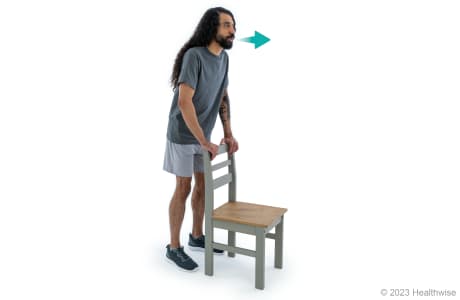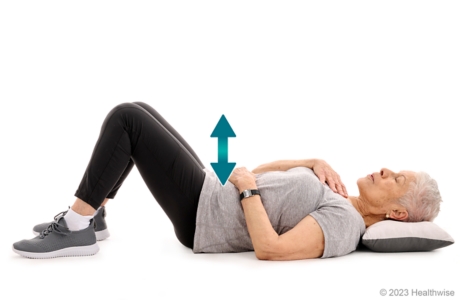Lung Problems: Learning to Breathe Easier
Make an Appointment
Our team is here to help you make an appointment with the specialists that you need.
Top of the pageActionset
Lung Problems: Learning to Breathe Easier
Overview
Breathing is hard when you have lung problems like chronic obstructive pulmonary disease (COPD) or interstitial lung disease. You may take quick, short breaths. Breathing this way makes it harder to get air into your lungs. Learning new ways to slow down and control your breathing may help. You may feel better and be able to do more because you can breathe better.
You can try two ways to control your breathing. They are pursed-lip breathing and diaphragmatic breathing (belly breathing).
Use these methods when you are more short of breath than normal. Practice them often so you can use them correctly when you need to.
How do you use these breathing methods?
Pursed-lip breathing

- Stand or sit up straight. Bend forward slightly at the waist. (Breathing while bending forward at the waist may make it easier for you to breathe.) Keep your back straight. If you are standing, you may want to rest your hands on the edge of a table or the back of a chair.
- Breathe in slowly through your nose, with your mouth closed. Breathe in for about 2 seconds.
- Pucker your lips like you would to blow out a candle. Then breathe out slowly through your lips for 4 to 6 seconds.
- Repeat the steps for about 10 minutes at a time, 3 or 4 times a day.
As you get more comfortable doing this breathing exercise, you can also do it to feel better when you are short of breath.
Pursed-lip breathing helps you breathe more air out so that your next breath can be deeper. It makes you less short of breath and lets you be more active.
Belly breathing

- Lie on your back. You can put a small rolled towel behind your neck or use a pillow for comfort. Or you can prop yourself up on several pillows.
- Put one hand on your belly and the other on your chest.
- Breathe in slowly through your nose. When you breathe in, push your belly out as far as possible. You should feel the hand on your belly move out, while the hand on your chest does not move.
- Breathe out slowly through your mouth. When you breathe out, you should feel the hand on your belly move in.
Practice this breathing method 3 or 4 times a day for about 10 minutes each time.
When you can do this type of breathing well while lying down, learn to do it while sitting or standing.
Credits
Current as of: July 31, 2024
Author: Ignite Healthwise, LLC Staff
Clinical Review Board
All Healthwise education is reviewed by a team that includes physicians, nurses, advanced practitioners, registered dieticians, and other healthcare professionals.
Current as of: July 31, 2024
Author: Ignite Healthwise, LLC Staff
Clinical Review Board
All Healthwise education is reviewed by a team that includes physicians, nurses, advanced practitioners, registered dieticians, and other healthcare professionals.
This information does not replace the advice of a doctor. Ignite Healthwise, LLC, disclaims any warranty or liability for your use of this information. Your use of this information means that you agree to the Terms of Use. Learn how we develop our content.
To learn more about Ignite Healthwise, LLC, visit webmdignite.com.
© 2024-2025 Ignite Healthwise, LLC.
This information does not replace the advice of a doctor. Ignite Healthwise, LLC, disclaims any warranty or liability for your use of this information. Your use of this information means that you agree to the Terms of Use. Learn how we develop our content.


